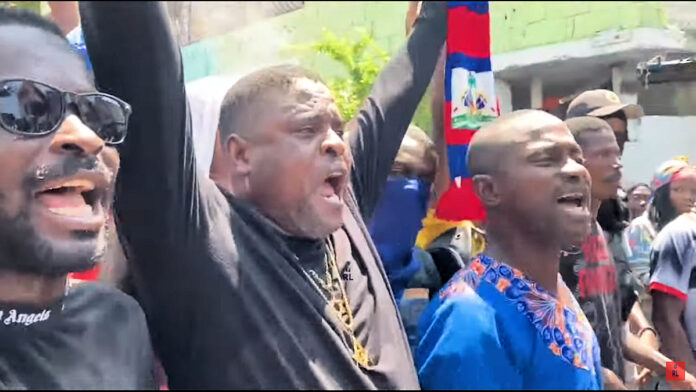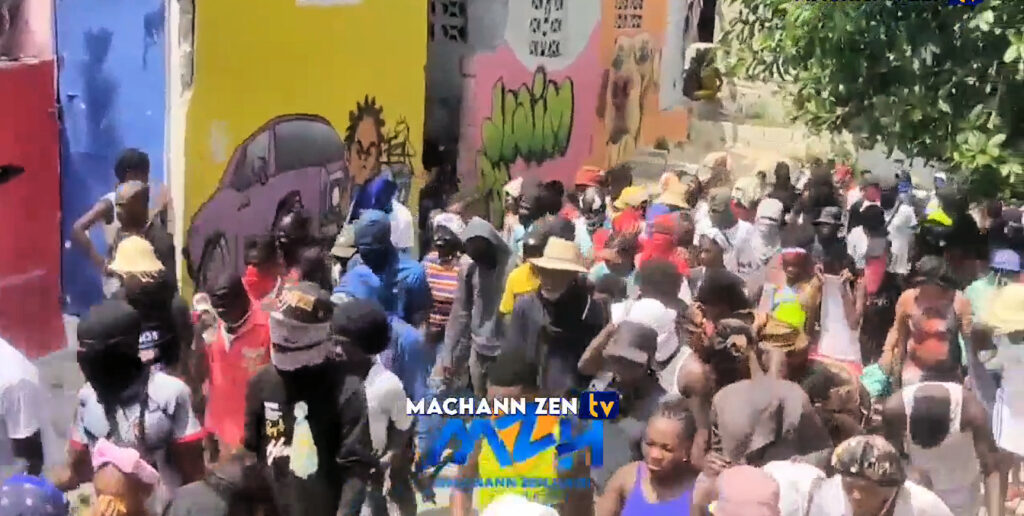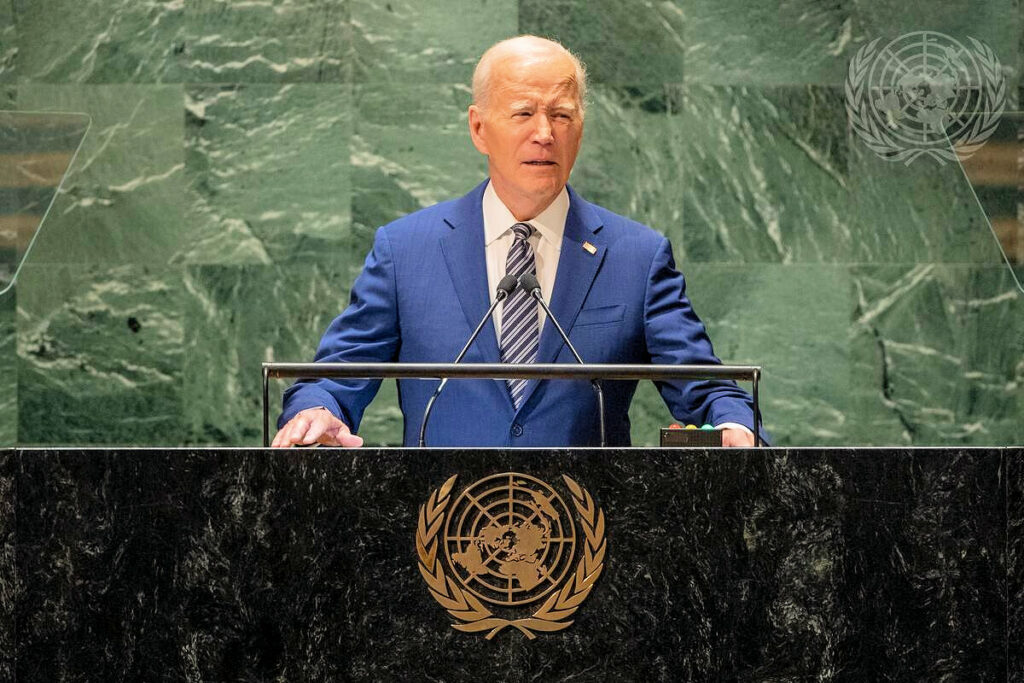
Over 1,000 people surged through the streets of Haiti’s capital Port-au-Prince on Sep. 18, calling for de facto Prime Minister Dr. Ariel Henry to step down and shouting their full support of Haitian farmers in the Northeast Department, who are finishing construction of an irrigation canal despite strong objection, threats, and border closure by Dominican President Luis Abinader.
The animated rally might have passed as just another of many anti-government protests over recent years, but this one was historic. At its head were two figures who until two months ago were bitter enemies: Marc-André “Toto” Alexandre, the spokesman for the capital’s Belair neighborhood, and Jimmy “Barbecue” Cherizier, the leader of neighboring Lower Delmas.
Surrounded by a gaggle of Haitian media camerapersons, the two jogged arm-in-arm chanting: “Ariel, Ariel, Ariel, hungry people don’t play. We are not playing around.”
“Biden, Trudeau, Macron, come collect your garbage,” they chanted with the crowd, referring to the three world leaders most responsible for inserting and maintaining Henry in power.
“Bwa Kale (raging erection) up Ariel’s ass” was another refrain the demonstrators delighted in chanting. Bwa Kale was the name of a spontaneous movement from late April through June in which crowds of machete-wielding Haitians would capture and deliver “expedited justice” to criminal gang members. Cherizier expressed support for the Bwa Kale movement at the time.
The truce now reigning between Delmas 2, 4, and 6 and their former foes in Belair, Ruelle Maillart, and Rue Tirmasse, is just the latest in a series of peace accords which have been established between formerly warring neighborhoods. Cherizier’s “Revolutionary Forces of the G9 Family and Allies, Mess with One, You Mess with All” (G9), which groups neighborhoods opposed to kidnapping, rape, and political manipulation by bourgeois oligarchs, was pitted against a federation called “G-Pèp,” most of whose member groups engaged in heinous criminality and violence for hire.

Earlier this year, Christ-Roy “Krisla” Chéry, the G9 leader of Ti Bois and Fontamara, brokered a peace with Grand Ravine’s Renel “Ti Lapli” Destina and Village de Dieu’s Johnson “Izo” Alexandre, two of Haiti’s most infamous G-Pèp kidnappers. Then in July, Gabriel Jean-Pierre, G-Pèp’s founder (though generally believed not to engage in major crimes) made peace with G9 leaders Iscard Andrice and Mathias Saintil in Cité Soleil, and shortly after the Delmas/Belair reconciliation was announced.
“Thank God, there is finally peace so we can get on with our lives,” one woman told Haïti Liberté on Aug. 30 as she stirred a boiling pot of food for sale on a barren street of Anbawozi, a warren of mostly burned-out buildings which were on the battle line between Belair and Lower Delmas. “I wish the government would help me rebuild my home. But I’m glad to be back and that the fighting has stopped so we can return to making a living. I hope it stays like this.”
Only the suburbs north of the capital currently remain at odds, where the G9 affiliates Chen Mechan (Mean Dog) and Kat Ponyà (Four Fists) still remain at war with G-Pèp members Jeff, Joseph “Lanmò Sanjou” Wilson’s 400 Mawozo, and Vitel’Homme Innocent’s Kraze Baryè (Break the Walls).
“Thank God, there is finally peace so we can get on with our lives.”
But the “peace” is hardly solid. In recent weeks, Ti Lapli has launched several attacks on the Carrefour Feuilles neighborhood, claiming he is responding to the aggression of policemen who live there. Also, the leader of the Belair gang, Kempes Sanon, who escaped in 2021 from a prison where he was serving a life sentence for kidnapping, has carried out assaults on the neighboring Solino and Fort National neighborhoods, some say with the assistance of Ti Lapli. These attacks on neighborhoods which have been relatively peaceful and neutral over the last five years have prompted speculation that Kempes and Ti Lapli are taking advantage of the larger peace with the G9 to settle their scores, particularly with Solino’s resident policemen. They have prevented kidnapping victims from being transported through their neighborhood into abutting Belair, which in recent times acted as a sort of hostage storage zone.
Despite such troubling violence and the skepticism of many radio commentators, Cherizier continues to defend the peace, while admitting that he is making a deal with the devil by burying the hatchet with his former nemeses.
“Ariel’s strategy to foil all the offensives we [in the G9] undertook against his government was to use people that look like us, to pit the G-Pèp against G9,” Cherizier said in one of several impromptu press statements made along the march route. “That’s how it used to be. But now there is neither G-Pèp or G9. There is only Viv Ansanm (Live Together). And today I, Jimmy Cherizier “Barbecue”, in order to put an end to Ariel Henry’s system, together with all the stinking politicians just like him and the stinking traditional journalists who are always destroying the people’s movement, today to do this movement against Ariel, I will ally with Satan if I have to or sit at the same table and eat with Lucifer. If that’s what we have to do to overthrow Ariel, we will.”
Despite suggesting they might be the devil, he also argued that the criminal gangs can be reformed.
“It’s a shame that some guys did not understand the reality of guns that were in their hands, and they did bad things to people who were just like them,” Cherizier explained. “Today when you hear the talk of Izo, of Jeff, of Vitel’Homme, of Lamò Sanjou, you’ll see that it is a group of young men who have gained consciousness and now say, ‘hey, people who look like us, we will not hurt them anymore or chase them, and we will instead fight against our true enemy. Because those guns in our hand can bring a real solution for Haiti.’”

Cherizier and Alexandre announced a mass at Belair’s Our Lady of Perpetual Help Church on Sep. 30, the anniversary of the 1991 coup d’état against President Jean-Bertrand Aristide, to commemorate the lives lost then and during the last five years. Cherizier said that after the mass, people would take to the street, and “whatever happens, happens.”
“Our battle isn’t just going to be to demonstrate with people in the streets. We have guns, and we will fight with them… We took our independence with arms. You journalists have to educate the people. You make people think that arms are a bad thing. A gun, when it’s in your hand and you know why it’s in your hand, it can be used to do a lot of things. Today, the guns that are in our hands, we know why they are in our hands. It’s God who put weapons into the poor neighborhoods.”
Ariel Henry traveled to New York for the United Nations General Assembly on Sep. 17, five full days before his Sep. 22 address to the body.
U.S. President Joe Biden addressed the UN on Sep. 19, thanking Kenya’s president “for his willingness to serve as the lead nation of a UN-backed security support mission. I call on the Security Council to authorize this mission now. The people of Haiti cannot wait much longer.”
The vote for the “UN-backed” mission was supposed to take place on Sep. 15 but was postponed due to Washington’s fear that Russia or China would veto the force, which is very different from a traditional UN “peace-keeping” army under the command of the Security Council. The troops Washington proposes do not have Security Council oversight but would simply be “deputized” by the body to assist Ariel Henry and the Haitian police in fighting the “gangs,” the sobriquet given to all armed popular groups in Haiti, whether criminal, anti-crime, or revolutionary.
“Our objective is to once and for all overthrow the system that exists in Haiti and achieve the dream of Dessalines, which is for the nation’s wealth To be shared by all its citizens.”
The vote was also postponed because tensions along the Dominican border are growing after Abinader deployed thousands of troops and closed all traffic and trade between the two countries on Sep. 14.
“I am extremely alarmed by the decision of the Dominican Republic’s government to close its land, sea, and air border with Haiti,” said William O’Neill, the UN’s expert on human rights in Haiti, who called for negotiations to resume. “I urge the [DR] Government to reconsider its decision, which will have serious impacts on people on both sides of the border.”
The Dominican Foreign Minister said he “categorically rejects” O’Neill’s statement and asserted that negotiations could only resume when Haiti stopped “the unilateral and illegal construction of its canal” on the Massacre River.
The Sep. 18 march was also to express solidarity with the people of Ouanaminthe, the border town closest to the nearly finished canal.
“Our objective is to overturn the stinking Ariel Henry government, which does not respond, while the Dominicans humiliate us and kill our brothers on the border,” Cherizier said. “We say to our brothers and sisters in Ouanaminthe, we love and support you. We can’t find a way to get to you, but if we could find some passage, we would come with all our material to reinforce Ouanaminthe. They say you are a movement or gangs and bandits. All the ghettoes are out today to say to Ouanaminthe, we are all one.”
The patriotic fever of unity has so gripped Haiti that even criminal gang leaders Izo and Vitel’Homme Innocent issued voice messages on Whatsapp saluting the valor and persistence of Ouanaminthe’s people in building the canal and vowed to drop all tolls, extortion, and kidnapping that used to plague travelers leaving Port-au-Prince along the roads to the north or south.
“We are now going to stand with the people, the problems of Haitians are for all Haitians” said Vitel’Homme’s message on Sep. 16. He told the Haitian people that they could pass through Martissant going to the south or Source Matelas going north “with complete peace of mind.”
“We know a little disorder used to happen,” he admitted, “but the people who used to do that disorder, we have solved their problem, which traces back to the government.”
Despite such statements and the “peace,” the Haitian people’s crime problem is not over. “Armed individuals believed to be members of the ‘Kraze Baryè’ gang led by Vitel’homme Innocent attacked the Vivy Mitchell neighborhood in the Pétion-Ville commune last weekend,” reported Haitilibre on Sep. 19. “According to testimonies from local residents, several houses in the area were looted, and several residents had to flee to save their lives.”
Cherizier, however, remains convinced that the Haitian people can overcome these difficulties. “We are a great people. Our national motto is ‘Union makes strength.’ Our objective is to once and for all overthrow the system that exists in Haiti and achieve the dream of [Haitian founding father Jean-Jacques] Dessalines, which is for the nation’s wealth to be shared by all its citizens, for everyone to have the same rights, regardless of your skin color… We want to end the system of discrimination and exclusion.”











[…] quoted by journalist Kim Ives, speaks his […]
[…] and Marc-André “Toto” Alexandre, the political spokesman for the Belair neighborhood, lead a march of over 1,000 in Port-au-Prince to demand that de facto Prime Minister Ariel Henry resign and to voice their strong support for the […]
This is a great write-up. Thank you for spending some time to describe all of this out for folks. It really is a great help!
[…] Cherizier, quoted by journalist Kim Ives, speaks his mind: […]
[…] Haiti’s bourgeoisie and U.S. imperialism. Today he is the leader and principal spokesman for the Viv Ansanm (Live Together) coalition of armed neighborhood committees that ousted Henry from power on Feb. 29 and is the target of the […]
[…] come after a period of unprecedented peace in Cité Soleil following the Viv Ansanm coalition’s formation in September 2023 and a follow-on truce in the giant slum forged in July 2024, sparking large street […]
[…] après une période de paix sans précédent à Cité Soleil après la Vivre ensemble la coalition formation en septembre 2023 et une trêve de suivi dans le bidonville géant forgée en juillet 2024déclenchant de grandes […]